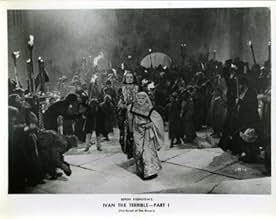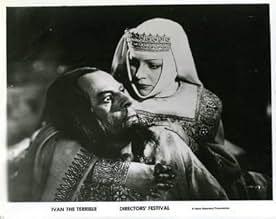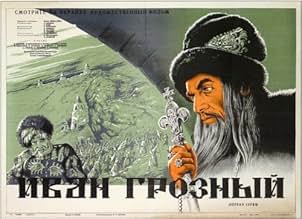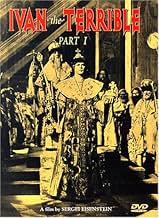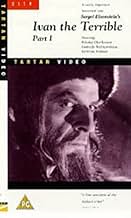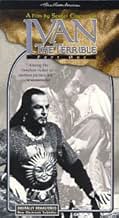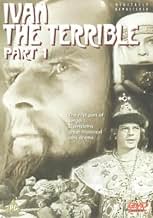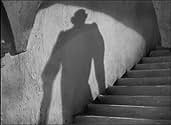CALIFICACIÓN DE IMDb
7.7/10
11 k
TU CALIFICACIÓN
Durante el inicio de su reinado, Iván el Terrible se enfrenta a la traición de la aristocracia e incluso de sus amigos más cercanos a la vez que busca unir al pueblo ruso.Durante el inicio de su reinado, Iván el Terrible se enfrenta a la traición de la aristocracia e incluso de sus amigos más cercanos a la vez que busca unir al pueblo ruso.Durante el inicio de su reinado, Iván el Terrible se enfrenta a la traición de la aristocracia e incluso de sus amigos más cercanos a la vez que busca unir al pueblo ruso.
- Dirección
- Guionista
- Elenco
- Premios
- 2 premios ganados y 1 nominación en total
Aleksandr Rumnev
- The Stranger
- (as Aleksandr Rumnyov)
- Dirección
- Guionista
- Todo el elenco y el equipo
- Producción, taquilla y más en IMDbPro
Opiniones destacadas
If Alexander Nevsky was a filmed opera, this one, the first part of Eisenstein's incomplete trilogy about the title character, looks more like a Stalinist version of a Shakespere play, with a lot of conspiracy and characters so desirous for power that are willing to do whatever it takes, but manichaeist and with almost undisguised propaganda of the infamous Russian dictator. Exactly for being theatrical, it is too formal, but it is so intense that it is impossible to be indifferent, the visual composition is extraordinary, using very well the light-and-shade game typical of the German Expressionism, the alternation between very open shots and close ups, and very rich costumes and set decoration. In the end, although it is not perfect, is a remarkable film that deserves all the praise it received.
This first part of Eisenstein's filming of the life and times of "Ivan the Terrible" has lots of drama, very good characterizations, fascinating settings, and plenty of action. Nikolai Cherkasov is completely convincing in the lead role, and the rest of the cast complements him well (especially Serafima Birman as his crafty aunt). This period in history is quite interesting and significant in itself, and Eisenstein presents everything in a fashion that is thoughtful and also enjoyable to watch.
Ivan combined a remorseless personal ambition with a genuine desire to strengthen and protect Russia, while the boyars, who opposed him, acted from motives that were almost exclusively personal. Combined with the plans of Russia's neighbors, all of this makes for a complex and interesting series of events, and the movie does a good job of presenting both the events and the possibilities, both on the surface and behind the scenes. Not the least of the reasons why it works so well are the settings. They are always interesting, believable, and atmospheric - and the indoor settings are especially so.
Part One is praiseworthy both in its own right and as the foundation for the outstanding sequel. Eisenstein generally excelled at depicting important periods in his country's history, and his series on Ivan's critical reign demonstrates all of his many skills. His attention to detail (of which there are too many examples even to try to list) and his appreciation for the overall picture make this a memorable film of high quality.
Ivan combined a remorseless personal ambition with a genuine desire to strengthen and protect Russia, while the boyars, who opposed him, acted from motives that were almost exclusively personal. Combined with the plans of Russia's neighbors, all of this makes for a complex and interesting series of events, and the movie does a good job of presenting both the events and the possibilities, both on the surface and behind the scenes. Not the least of the reasons why it works so well are the settings. They are always interesting, believable, and atmospheric - and the indoor settings are especially so.
Part One is praiseworthy both in its own right and as the foundation for the outstanding sequel. Eisenstein generally excelled at depicting important periods in his country's history, and his series on Ivan's critical reign demonstrates all of his many skills. His attention to detail (of which there are too many examples even to try to list) and his appreciation for the overall picture make this a memorable film of high quality.
I have two comments to make about some disparaging remarks made by other contributors: First, it is naive to condemn this film as "propaganda" -- GONE WITH THE WIND is all propaganda about how great the Old South was and how great the Ku Klux Klan was. LAWRENCE OF ARABIA is propaganda about how heroic and clever the English were and how corrupt the Turks were. DR STRANGELOVE is all propaganda, too. THE ALAMO and other John Wayne films are propaganda about how great the conquest of the West was, how heroic the ethnic cleansing against the Indians was, and how corrupt the Mexicans were. So spare me your hypocritical condemnation of this film as "Stalinist Propaganda".
Secondly, what definitions can there be for whether a film is "great" or not? I suggest the use of two criteria: (A) Is viewing the film multiple times worthwhile and interesting? (B) Does viewing the film represent a memorable life experience? With these criteria, it does not matter whether the film is "dated" or the acting is "overdone" or whether the sound is flawed or in this or that quality. I certainly find IVAN THE TERRIBLE more interesting the more times I view it. On the other hand, there are movies that I consider "great" even though I refuse to watch them ever again, because I found them unbearably sad -- recent examples are SCHINDLER'S LIST and MILLION DOLLAR BABY.
Secondly, what definitions can there be for whether a film is "great" or not? I suggest the use of two criteria: (A) Is viewing the film multiple times worthwhile and interesting? (B) Does viewing the film represent a memorable life experience? With these criteria, it does not matter whether the film is "dated" or the acting is "overdone" or whether the sound is flawed or in this or that quality. I certainly find IVAN THE TERRIBLE more interesting the more times I view it. On the other hand, there are movies that I consider "great" even though I refuse to watch them ever again, because I found them unbearably sad -- recent examples are SCHINDLER'S LIST and MILLION DOLLAR BABY.
I've seen this a number of times now so it's difficult for me to remember having trouble getting into the stylised form of acting and by 1944 dated expressionistic cinematography that other viewers might have. First time of watching it was on UK TV over 20 years ago with Part 2 and a documentary called Part 3 containing the remaining extant scenes, and I loved it. I'm dead against arty farty pretentious movies and am always aware that being obscure does not automatically make a film a classic, but this really is a classic of its kind. It was Eisenstein's best work (imho) a rallying call to all of the disparate inhabitants of Mother Russia to work and fight together, which was ordered by Stalin and who was pleased with the similarities I bet he was on tenterhooks waiting for Ivan to go insane though.
Ivan is crowned Tsar of all the Russias and proceeds to drag the country into the 16th century, disposing of external enemies in the form of Tartars, starting a long war against Livonia and limiting the influence of the antagonistic aristocracy, the boyars. The acting is intensely melodramatic, with endless sinister sidelong glances taken from acute camera angles and Ivan's pointy beard shown to good advantage, which to people not paying much attention can probably be mirth-inducing. But this was pulse-quickening propaganda for the new Russian working class to comprehend, not Artheads decades later - Eisenstein did it so memorably that like Potemkin it's still spellbinding today. Otoh he borrowed extensively from Snow White too for some of most incredible shadowy images in here, and his whole technique hadn't moved on from silent film. The use of the b&w nitrate film, costumes, sets and angular ugly faces are wondrous to behold and Prokofiev's stirring music glues it all together triumphantly.
All in all, a knockout film with faults but which still defies and will survive all criticism.
Ivan is crowned Tsar of all the Russias and proceeds to drag the country into the 16th century, disposing of external enemies in the form of Tartars, starting a long war against Livonia and limiting the influence of the antagonistic aristocracy, the boyars. The acting is intensely melodramatic, with endless sinister sidelong glances taken from acute camera angles and Ivan's pointy beard shown to good advantage, which to people not paying much attention can probably be mirth-inducing. But this was pulse-quickening propaganda for the new Russian working class to comprehend, not Artheads decades later - Eisenstein did it so memorably that like Potemkin it's still spellbinding today. Otoh he borrowed extensively from Snow White too for some of most incredible shadowy images in here, and his whole technique hadn't moved on from silent film. The use of the b&w nitrate film, costumes, sets and angular ugly faces are wondrous to behold and Prokofiev's stirring music glues it all together triumphantly.
All in all, a knockout film with faults but which still defies and will survive all criticism.
Eisenstein's 'Ivan the Terrible' once featured in an American book of the 50 worst films of all times, along with 'Attack of the Killer Tomatoes' and 'Plan 9 from Outer Space'.
But as true cinemaniacs acknowledge, 'Ivan', along with 'Ivan the Terrible Part 2', is one of the great masterpieces of the screen. Its style is highly artificial, the acting operatic with no condescension to realism. But the viewer is swept away by the stylised pacing, the way each scene is so precisely plotted and designed -- each camera shot becomes a precious ornamented jewel. The film is, like the earlier 'Alexander Nevsky', as much a vehicle for the great Russian composer Prokofiev as for Eisenstein -- the two attained a cinematic union of image and music which has been rarely equaled since.
The two 'Image' Region 1 DVDs for Ivan Parts One and Two are spartan affairs, with no added features. The orchestral soundtrack is definitely low-fi. But the print sources must have been excellent -- the black-and-white prints are as lustrous as the finest modern movie, the images sharp and clear. And when the film suddenly switches from black-and-white and erupts in colour, the colour is dense and brilliant, unlike the bleached and pale versions usually doing the art-cinema rounds.
How fantastic to have available such treasures on DVD, in such pristine condition! Buy! Buy! Buy!
But as true cinemaniacs acknowledge, 'Ivan', along with 'Ivan the Terrible Part 2', is one of the great masterpieces of the screen. Its style is highly artificial, the acting operatic with no condescension to realism. But the viewer is swept away by the stylised pacing, the way each scene is so precisely plotted and designed -- each camera shot becomes a precious ornamented jewel. The film is, like the earlier 'Alexander Nevsky', as much a vehicle for the great Russian composer Prokofiev as for Eisenstein -- the two attained a cinematic union of image and music which has been rarely equaled since.
The two 'Image' Region 1 DVDs for Ivan Parts One and Two are spartan affairs, with no added features. The orchestral soundtrack is definitely low-fi. But the print sources must have been excellent -- the black-and-white prints are as lustrous as the finest modern movie, the images sharp and clear. And when the film suddenly switches from black-and-white and erupts in colour, the colour is dense and brilliant, unlike the bleached and pale versions usually doing the art-cinema rounds.
How fantastic to have available such treasures on DVD, in such pristine condition! Buy! Buy! Buy!
¿Sabías que…?
- TriviaTook over 3 years to make.
- ErroresAfter Anastasia's death, when discussing the Livonian war the "only" son of the Czar is mentioned. However at the time Ivan had two sons, Feodor, who became Czar Feodor I of Russia, and also Tsarevich Ivan Ivanovich.
- Citas
Czar Ivan IV: Those who tore down the bells without Czar's permission, those by Czar's command get torn down the heads for not too long.
- Créditos curiososAll the credits are showed in front of a fire smoke.
- ConexionesEdited into Histoire(s) du cinéma: Une histoire seule (1989)
Selecciones populares
Inicia sesión para calificar y agrega a la lista de videos para obtener recomendaciones personalizadas
- How long is Ivan the Terrible, Part I?Con tecnología de Alexa
Detalles
Taquilla
- Total a nivel mundial
- USD 12,196
- Tiempo de ejecución1 hora 43 minutos
- Color
- Mezcla de sonido
- Relación de aspecto
- 1.37 : 1
Contribuir a esta página
Sugiere una edición o agrega el contenido que falta

Principales brechas de datos
What is the German language plot outline for Iván el Terrible (1944)?
Responda

